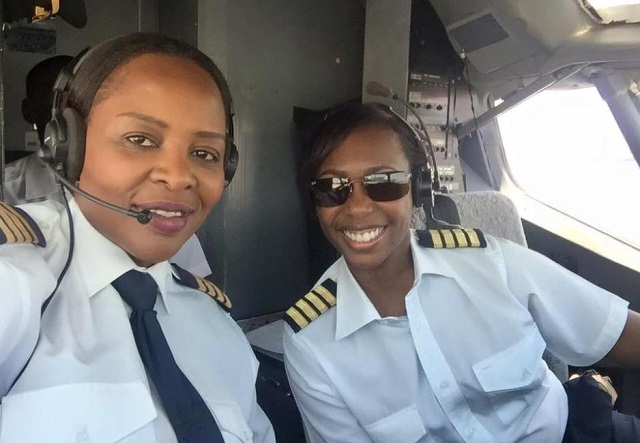
The Sunday News

Charity Ruzvidzo
ZIMBABWE’S first all-female flight deck crew is a demonstration of the remarkable efforts the country has taken towards achieving women empowerment for the past 37 years.
As Zimbabwe commemorates its independence, the economic, political and social transformative measures put in place by Government to improve women’s livelihoods cannot be ignored. Despite the current economic challenges, women, who constitute 52 percent of Zimbabwe’s population have utilised the opportunities availed to them to transform their lives for the better. This evident passion to excel regardless of gender disparities saw two Air Zimbabwe female pilots make history.
In 2015, Chipo Matimba and Elizabeth Simbi Petros flew a Boeing 737 from Harare to Victoria Falls becoming the first all-female flight crew. Early this month, President Mugabe returned to Zimbabwe from Mauritius on an Air Zimbabwe A320 Airbus flown once again by an all-female flight crew.
The crew was led by Chipo Matimba as captain, Ms Thandi Dube as the first officer, Constance Masimbe and Mary Murimba as senior flight attendants. This is testimony to the Government’s thirst to empower women. Before independence, access to education, health and other necessities was a struggle for the black man, let alone a black woman. In the post-independence period, the Government has made access to education a possibility.
Both females and males are now afforded equal opportunities to study any degree or course of choice at any chosen institution. Though the fight still goes on, most Zimbabweans now appreciate females as much as they value males in any given setup.
The country now boasts of qualified female medical doctors, engineers, pilots, psychologists, judges and officers in the army.
Some are now decision-makers in the corporate sector while there are more female police officers and others are now running flourishing businesses.
Politically, women can now contest for any position. In the cabinet, there are ministers that include Minister of Small and Medium Enterprises and Co-operative Development (SMEs), Sithembiso Nyoni, the Minister of State for provincial Affairs in Harare Metropolitan Province Miriam Chikukwa and Environment, Water and Climate Minister Oppah Muchinguri-Kashiri among others.
This change was not drastic. The Government put in place policies and legislations to push women empowerment in a country were most high positions were traditionally reserved for men. The Ministry of Women Affairs Gender and Community Development was formed in 2005 to spearhead women empowerment, gender equality and equity for community development.
The ministry seeks the most effective ways of integrating gender equality and women’s empowerment in the key areas of poverty eradication and sustainable development. In line with its mandate the ministry ensures that women become key participants in the economy through meaningful involvement in all key sectors of the economy.
It provides economic opportunities for women, namely the quantity and quality of women’s economic involvement in leadership and ownership of the means of production, beyond their mere presence as workers. Educational empowerment of women which is a most fundamental prerequisite for empowering women in all spheres of life is also another mandate of the ministry.
Economic empowerment for women in Zimbabwe has largely been associated with small-scale informal ventures including cross border trade, vending, hairdressing, subsistence farming and care work.
Changes have however, taken place. Before independence most women were farm labourers but this is no longer the case as most women are now farm owners contributing to the country’s agricultural production.
The Government’s input schemes have also benefited most women in the farming sector. Women are also defying odds as they are venturing into mining, a sector which for years has been male-dominated, maybe due to the strenuous nature of the work.
An association, Woman in Mining, was created to spearhead the licensing of women into artisanal miners and it has been playing a leading role in women’s participation in mining.
Women entrepreneurship and empowerment is a good vehicle to economic growth. It goes without saying that the Government and civil society have held rigorous campaigns against early childhood marriages.
However, the country still has high records of early childhood marriages and cases of domestic violence in Mashonaland Central. This calls for more to be done to cover the gap that still remains. SMEs account for 70 percent of the country’s businesses with the majority being women and the youth. The high population of women in Zimbabwe shows they are key to unlocking the economic potential in the country.
It is pivotal to guarantee the rights of women and young girls in order for them to flourish and contribute towards the country’s development.
In most African countries women have fewer opportunities for economic and political participation than men. For Zimbabwean women each year after independence has brought about new dimensions of empowerment creating opportunities for women and girls to scale new and greater heights.
— Zimpapers Syndication.



